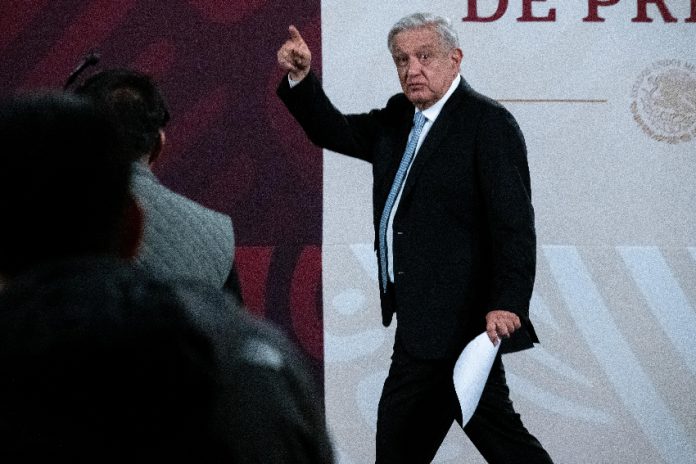President López Obrador found himself in hot water this week after he told a joke at the conclusion of his Wednesday press conference instead of responding to reporters’ questions about the presumed murder of five young men in Jalisco.
As several reporters put questions to him at the same time, AMLO said:
“Yesterday a friend told me that his wife said to him, ‘Give me 200 pesos to go to the market.'”
“I can’t hear you,” continued López Obrador, playing the role of an apparently hard of hearing husband. “[Speak] here, in the other one,” he said as he gestured to his left ear.
“‘Give me 500 pesos to go the market,'” AMLO said, once again imitating the wife.
“‘I’d prefer 200,'” he concluded, reaching the punch line of the joke.
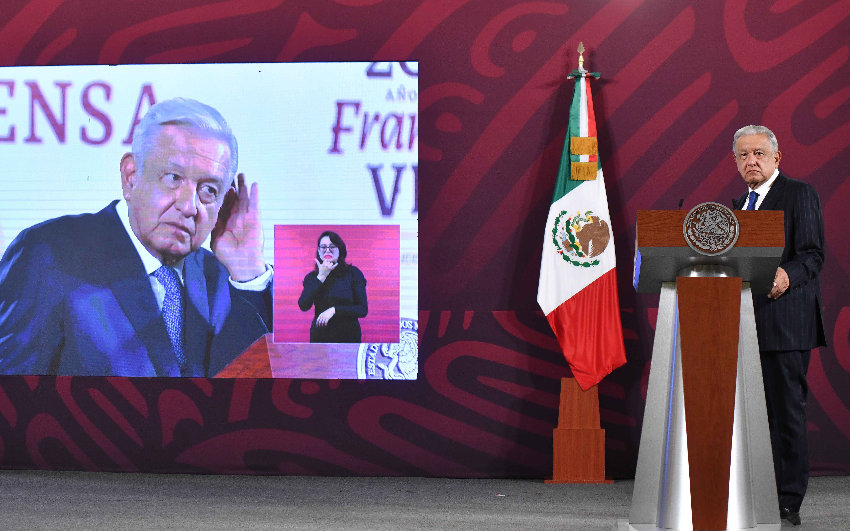
On Thursday morning, López Obrador rejected criticism that he had demonstrated indifference to the shocking crime, saying that he simply didn’t hear the questions.
“Do you think that if I heard what you were asking me, I wouldn’t answer?” he asked the press corps.
Monday
The federal government will comply with a Supreme Court ruling against the distribution of the Ministry of Education’s controversial textbooks in the state of Chihuahua, López Obrador told reporters at his Monday mañanera.
“We’re facing a special case of a very reactionary, conservative, irresponsible and politically motivated governor who filed a lawsuit so that the books aren’t delivered to the children, the students in Chihuahua,” he said.
“And a dishonest justice ordered the books not to be distributed, leaving the children … of Chihuahua without textbooks,” AMLO said.
“What are we going to do? Well, we’re going to respect the decision, even though the federal executive power has the authority to produce and distribute textbooks. It’s a constitutional mandate, but we’re going to stop the distribution of the textbooks in Chihuahua,” he said.
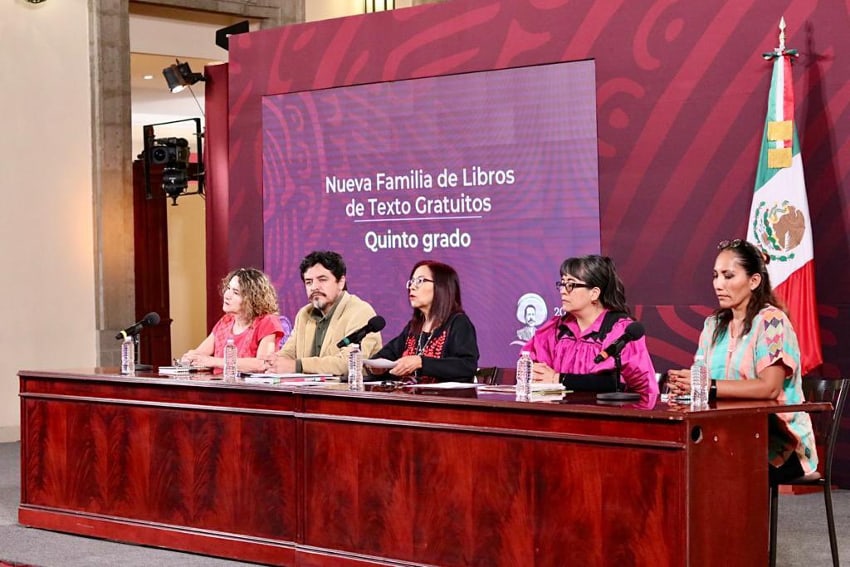
In light of the ruling, the president once again advocated in favor of “the people” electing Supreme Court justices and other judges because “renovation of the judicial power is needed.”
“… This will require a constitutional reform and for a constitutional reform to be carried out a supermajority [in Congress] is needed,” said AMLO, who has committed himself to putting forward such a proposal during his final month in office in September 2024, the month in which lawmakers elected next June will take their seats in the Chamber of Deputies and the Senate.
At next year’s elections, López Obrador continued, voters will have to decide whether they want the “regime of corruption” to return or whether they want the “transformation” of Mexico being carried out by his government to continue.
AMLO added that he could die “peacefully” because poverty and inequality has decreased during his term in government.
“Five million Mexicans have come out of poverty despite the pandemic, despite the economic crisis [it precipitated],” he said, referring to the reduction in poverty between 2018 and 2022, as reported by the National Council for the Evaluation of Social Development Policy last week.
“Five million! It’s the entire population of Chiapas. How many people live in Chiapas?”
“Approximately six million,” responded Chiapas Governor Rutilio Escandón, who spoke about the Maya Train earlier in the press conference.
“Six million [people in Chiapas and] five million who are no longer poor. That hadn’t happened in 40 years,” declared the president.
Later in his presser, López Obrador recalled that some of his adversaries warned before the 2018 presidential election that there would be capital flight if he won and a devaluation of the Mexican peso would occur.
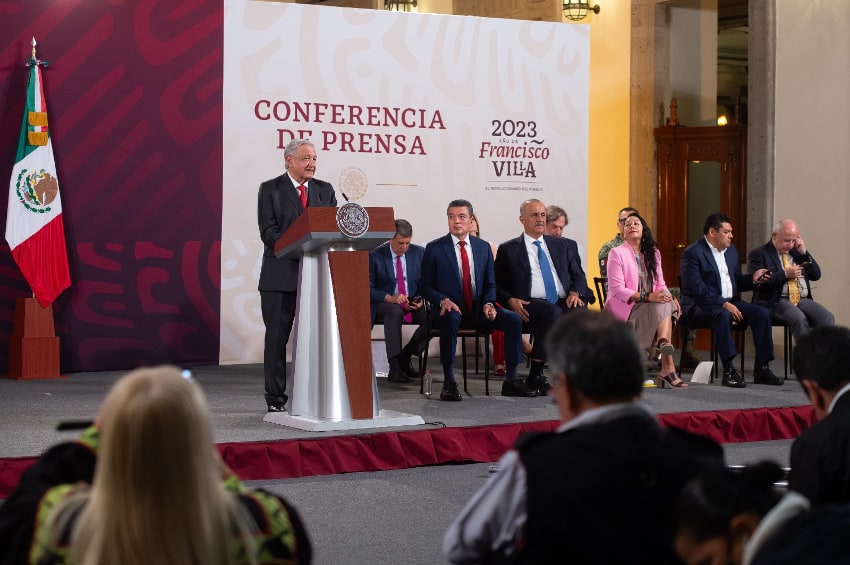
They said that people “weren’t going to be able to have more than one house because if they had two we were going to take one away,” AMLO continued.
“… It seems like a lie, but it was part of the campaign we faced when they said I was a danger for Mexico, that Mexico was going to be like I don’t know what country and that I was going to be like I don’t know which leader,” he said, alluding to claims that Mexico would become like Venezuela under his leadership.
“Do you remember? These experts, [journalist Carlos] Loret de Mola and others, said: ‘You have to buy [US] dollars’ because they calculated that the dollar was going to get to 25, 30 pesos,” López Obrador said, citing in the first instance the prevailing exchange rate at one point early in the coronavirus pandemic.
Shortly before concluding his engagement with reporters, AMLO reiterated his view that there is no political polarization in Mexico.
“What is polarization?” he asked before asserting that such a situation would only arise if Mexicans supported and opposed the government in equal or roughly equal numbers.
However, seven in 10 citizens are in favor of the government, López Obrador claimed, making a questionable extrapolation of results from a telephone poll that showed strong – but more modest – support of 61%.
“Half the people in Chiapas don’t have a telephone and they’re the ones who support us the most,” he said.
Tuesday
Zoé Robledo, head of the Mexican Social Security Institute (IMSS), reported that 22 of Mexico’s 32 federal entities have agreed to “transfer” hospitals and health care centers to the IMSS-Bienestar universal health care scheme, which went into operation just over a year ago.
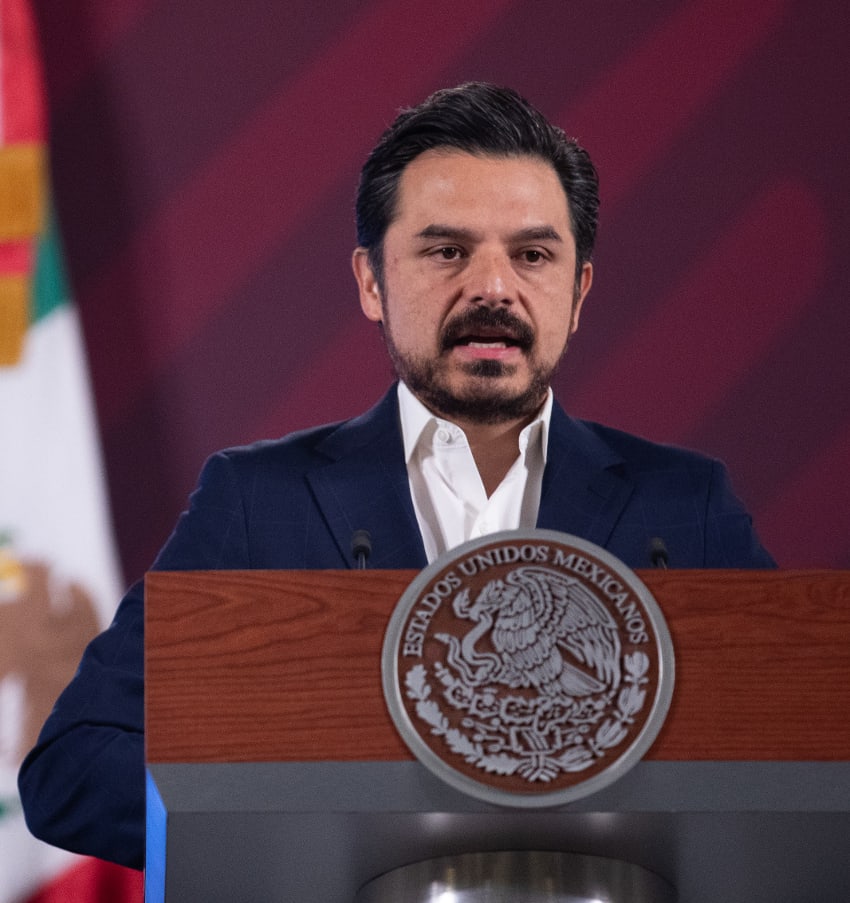
The new “care model” called MAS-Bienestar is already operating in 16 of the entities, he said.
Just under 2.6 billion pesos (US $151.6 million) has been spent on refurbishing 135 public health care facilities that are part of the IMSS-Bienestar system, Robledo said.
In addition, just under 84,000 pieces of medical equipment including X-ray machines and MRI scanners have been purchased for just over 10 billion pesos (US $583.2 million) and almost 5,500 specialists have joined the universal health care scheme, he said.
“What do we achieve with this? [Universal health] care coverage, an increase in productivity and a decrease in out-of-pocket spending by families who had to pay for this care before,” Robledo said.
Later in the press conference, Culture Minister Alejandra Frausto reported that almost three-quarters of over 3,000 heritage-listed buildings damaged in the two major earthquakes of September 2017 have been repaired.
“There hasn’t been a catastrophe for cultural heritage as large as that caused by the 2017 earthquakes,” she said, explaining that 3,269 historical buildings across 11 states were damaged in the earthquakes of Sept. 7 and Sept. 19 of 2017.
Repair work on 2,386 buildings has concluded, Frausto said before noting that the figure equates to 73% of all the heritage-listed edifices that sustained damage. Just over 6.65 billion pesos (US $388.1 million) has been spent on the repairs, she said, adding that 926 additional projects are being carried out this year.
“In total we will be investing 10.03 billion pesos on the restoration of these assets that are so important for communities,” the culture minister said.
Back at center stage, AMLO said that welfare payments, the transfer of remittances to Mexican families by workers abroad and the construction of public infrastructure projects all contributed to the decrease in poverty during his government’s first four years in office.
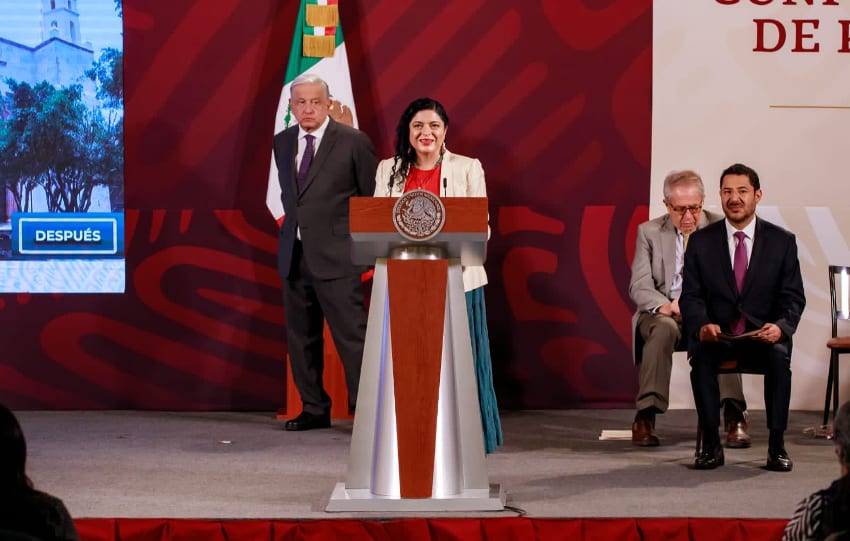
“In the final year of [the government of] president Peña Nieto, public investment was 500 billion pesos. Public investment this year is one trillion pesos [US $58.6 billion] – double. Public investment, building projects, getting the construction industry going, creates a lot of jobs,” he said.
López Obrador asserted that the Mexican economy will get a boost in coming years from the operation of the Maya Train railroad and the Isthmus of Tehuantepec Interoceanic Corridor as well as continuing flows of foreign investment.
He later revealed that he will sit down with United States President Joe Biden for a bilateral meeting during the Asia-Pacific Economic Cooperation summit in San Francisco in November.
AMLO said that pan-American economic integration and development will be on the agenda for his meeting with the U.S. president.
“What I’m proposing is that we don’t limit ourselves to consolidating the market and economic activity in North America, but rather seek the integration of all the American continent,” he said.
“… I’m also suggesting that a development plan can be implemented in all of the Americas, something like the Alliance for Progress,” he said, referring to the regional plan initiated by former U.S. president John F. Kennedy in 1961.
“… [I’m proposing] a plan that we can carry out to attend to the people, to address … the migration phenomenon, so that there is justice … and also to combat violence,” he said.
“All this concerns us a lot. It’s also proven that the best thing is development, the best thing is [economic] growth with wellbeing,” López Obrador said, adding that he believed that an agreement between all the nations of the Americas “can be achieved, … without excluding anyone.”
Wednesday
AMLO disagreed with a reporter who researched election costs in different countries around the world and found that elections in Mexico are less expensive per voter than those in several countries including Panama, Costa Rica, France, England and Japan, but costlier than those in the United States, Brazil, Argentina and Spain, among other nations.
“I have other information. … I have information that only in the United States … [are elections] more expensive than in Mexico,” López Obrador said.
He said that spending on elections in Mexico – US $14 per voter, according to the the reporter – is excessive and that savings to the tune of 10 billion pesos (US $583.5 million) could be made.
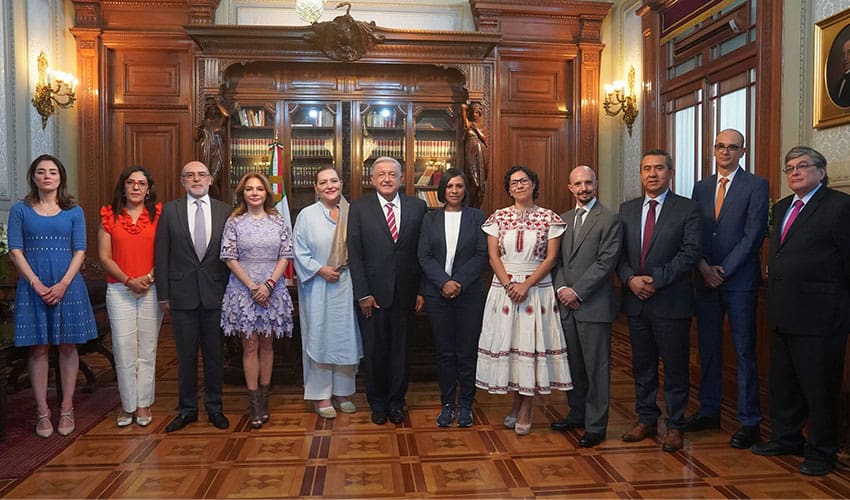
The savings could go to addressing the many “deficiencies” and “needs” in Mexico, AMLO said.
The president – whose “Plan B” electoral reform cutting the budget of the National Electoral Institute (INE) was invalidated by the Supreme Court earlier this year – said he would propose another constitutional electoral reform before he leaves office in late 2024.
“I’m also going to send [to Congress] a reform bill so that the people elect judges, magistrates and justices,” he reiterated. “And I have two or three other outstanding initiatives that have to do with social issues.
Asked about the appointment of former Tamaulipas governor Francisco García Cabeza de Vaca as security coordinator for the Broad Front for Mexico opposition bloc, López Obrador said he had no comment.
AMLO, who has been barred from offering opinions about electoral issues by the INE, added that speaking about the appointment of the ex-governor – ironically accused of ties to organized crime by federal authorities – wasn’t a good idea due to the risk of being sanctioned.
Later in his presser, López Obrador declared that the Ministry of National Defense and the Ministry of the Navy are the “two pillars that support the state.”
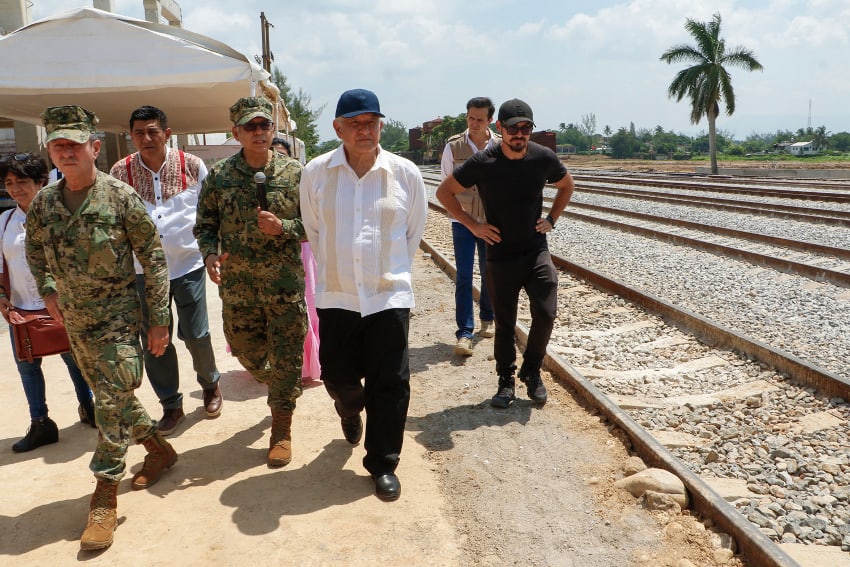
“They are two very important institutions and they have supported us a lot,” said AMLO, who has used the military for a wide range of non-traditional tasks including public security, infrastructure construction and the management of customs, ports and airports.
The army and the navy also “helped a lot with the pandemic,” he noted.
“What would we have done without them to distribute more than 200 million doses of vaccine across the entire national territory?”
In addition, soldiers and marines are the first to arrive in disaster areas when floods, fires, landslides and earthquakes occur, López Obrador said.
Continuing his praise of government officials, AMLO said that his cabinet ministers have helped him a lot during his time as president.
“It’s a good cabinet of women and men. I couldn’t make progress without a team,” he said.
“… [They are] women and men with conviction, with love for the people, honest, hard-working [people],” López Obrador said.
He also spoke glowingly about the government’s apprenticeship scheme, Youths Building the Future, saying that his labor minister had informed him that 100 billion pesos had been spent on the program and 2.6 million young people have benefited.
“Of these 2.6 million young people, … more than 60% of them were hired in the same companies, the same work centers where they were trained,” AMLO said.
Just before the end of his press conference, reporters attempted to elicit a response from the president about the disappearance and presumed murder of five young men in Lagos de Moreno, Jalisco.
But López Obrador chose to close his presser with a joke, a decision that was later criticized by some newspapers and opposition presidential aspirants Xóchitl Gálvez and Santiago Creel, among others.
Thursday
At the start of his presser, AMLO asserted that he didn’t hear the questions about the Lagos de Moreno case at the end of his previous mañanera because several reporters were shouting at the same time.
“That’s why I told that joke. And, without any foundation, in a perverse way, they maintained all day yesterday in the bought and rented press that I had mocked [reporters] when they asked me about the young men that were murdered, who disappeared,” he said.
“… It’s a complete lie, a slur. … Who gave flight to this libel? The same ones as always. Those who belong to the conservative bloc. A corrupt aspirant to the presidency, other corrupt aspirants and of course the representatives of the neoliberal governments, … representatives of the oligarchy and all the media outlets, with honorable exceptions,” López Obrador said.
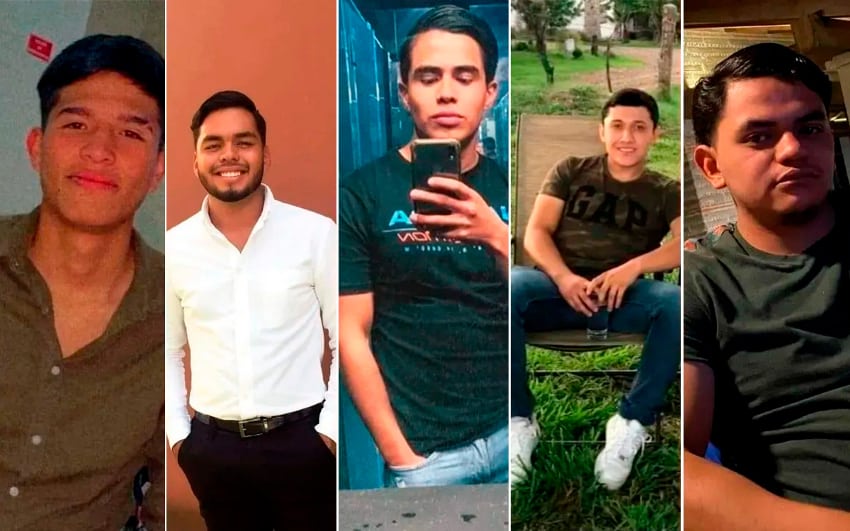
He said that the federal government is “attending” to the “regrettable” case of “the murder of these young men” and that the Federal Attorney General’s Office will decide whether it takes over the investigation, as Jalisco authorities have requested.
López Obrador also acknowledged the discovery of 17 bodies in freezers in houses in the city of Poza Rica, Veracruz, saying that the state Attorney General’s Office is “attending to this matter.”
After a reporter from Argentina noted that right-wing candidate Javier Milei won the Aug. 13 presidential primary in the South America nation, AMLO declared that “the people of Latin America and the people of the world can’t expect anything good from right-wing, conservative governments.”
“They will always represent a greedy minority. And it’s regrettable, very regrettable, that these governments continue making advances and triumphing over those who seek justice,” he said.
Later in his press conference, the president declared that Pope Francis, another Argentine, is “the most important political-spiritual leader in the world.”
“… Why do I say it? Because he is a pope committed to just causes, a pope in favor of the poor, a consequential pope, a Christian pope,” he said.
“… The essence of Christianity is support for the poor. Christianity is humanism. That’s why I say he’s a world leader, there’s no one else like Francis.”
One reporter asked the president to address Marcelo Ebrard’s claim that the federal Ministry of Welfare is supporting the campaign of his chief rival for the ruling Morena party’s presidential election nomination, former Mexico City mayor Claudia Sheinbaum.
AMLO said his former foreign minister is within his rights to make such a claim, but asserted that his government isn’t favoring any of the aspirants to the Morena nomination.
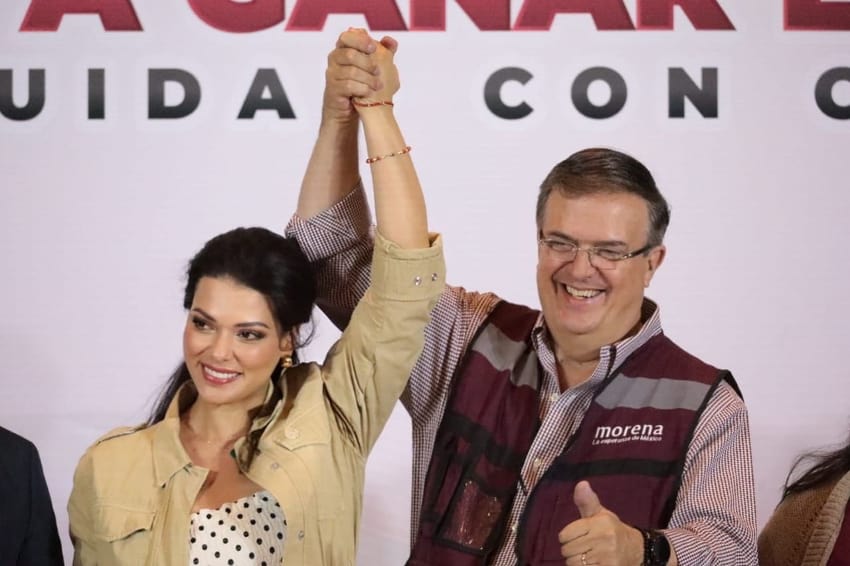
“Marcelo and [former interior minister] Adán [Augusto López] and Claudia and all [of the aspirants] know me perfectly well and they know that I don’t have double standards [and don’t engage in] double-talk. They know that we’re not involved [in the selection process], that the dedazo is over and that it’s the people who will decide,” he said.
Friday
The government has “saved” 281 billion pesos (about US $16.5 billion) since it took office by combating fuel theft, AMLO told reporters.
However, he acknowledged that the crime – most commonly committed by siphoning fuel from Pemex pipelines – is still a problem in parts of the country such as the states of Hidalgo and Puebla.
“But we’re attending to the matter and there has been a considerable reduction in the theft of gasoline,” López Obrador said.
Later in his presser, AMLO acknowledged that the United States government has requested the establishment of a dispute settlement panel to rule whether Mexico’s soon-to-be enforced restrictions on genetically modified corn imports violate the North American free trade pact, the USMCA.

“What we did, and this is why they complained, is to issue a decree so that yellow corn, which we consider genetically modified, isn’t used for human consumption,” he said. “Yellow corn can be used as fodder but not for human consumption.”
López Obrador asserted that the United States’ opposition to Mexico’s plan stems from the pressure imposed on politicians by “big agriculture.”
“In the United States … large corporations give campaign money to representatives, to senators, to presidents. So those representatives, those senators … are like their employees, more at their service than at the people’s. It’s a complete distortion,” he said.
“Those representatives, those senators – not all of them, of course – also receive money from the magnates of the arms industry and that’s why they defend the arms build-up in Congress,” AMLO added.
He said it was a good thing that the U.S. is challenging Mexico’s GM corn decree because it will allow his government to present “proof” to the panel and “make proposals.”
“What is our proposal? That we form a joint group of researchers in order to find out for sure whether … genetically modified corn causes harm or not to [human] health. We maintain that it does but we’re going to form a joint team,” López Obrador said.
He said that his government wouldn’t allow GM corn to be used “for the food of the people of Mexico,” but also committed to complying with the decision reached by the panel.
Asked about a group of pro-Ebrard Morena lawmakers who said Thursday that they would file complaints against the Ministry of Welfare for “the use and manipulation of social programs in favor of Claudia Sheinbaum,” AMLO attributed the move to pre-polling jitters, noting that polling of citizens to determine Morena’s presidential candidates will soon begin.
“I don’t see any manipulation. What there is is anxiety, doubts, nervousness … on the eve of a very important decision that the people – not the president – will take,” he said.
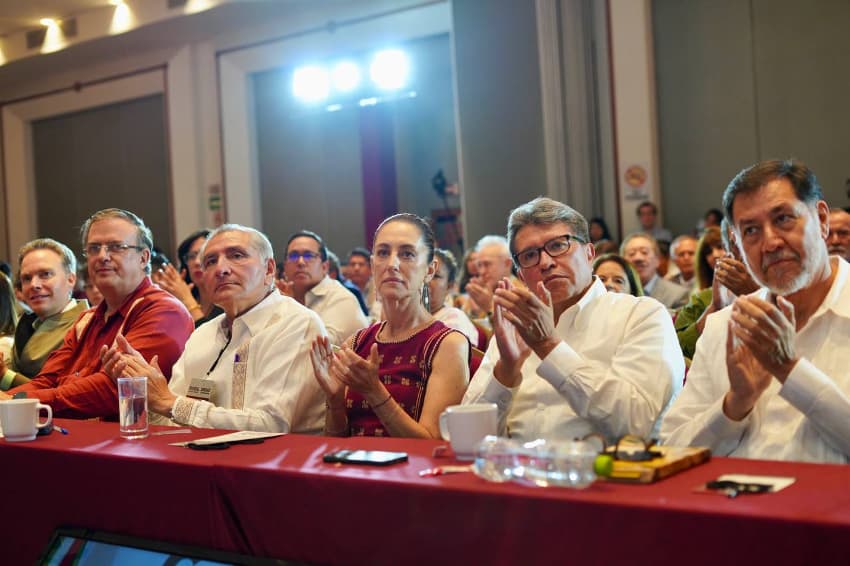
López Obrador ruled out any possibility of a “rupture” in Morena, the party he founded.
Near the end of his final presser of the week, AMLO once again lashed out at those who accused him of making light of the apparent murder of the young men in Jalisco, and noted that his security cabinet meets first thing in the morning to discuss security issues and fine-tune the government’s strategy.
“We’re working every day to guarantee peace and tranquility in the country. … Do you think that president Peña got up at at five in the morning [to attend to security matters]? Do you think Felipe Calderón got up at five? … Every day we’re attending to [security issues] responsibly. That’s why they’re very perverse when they make up things like they did the day before yesterday,” he said.
A short time later, López Obrador bade farewell to reporters and almost left the mañanera stage. However – determined not to be accused of ignoring an important issue for the second time this week – he returned to his lectern and assured the press corps that the government is prepared for the arrival of Hurricane Hilary on the Baja California peninsula.
“The army is already … [carrying out] preventive activities,” he said, adding that thousands of soldiers have been deployed to respond to the storm.
By Mexico News Daily chief staff writer Peter Davies (peter.davies@mexiconewsdaily.com)
